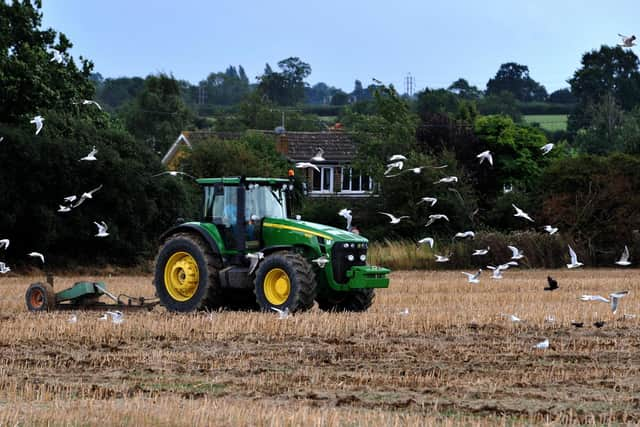Ukraine-Russia: Farmers warn of spiralling inflation amid 'perfect storm' as food shortage the 'ultimate risk'
Martin Kennedy, the president of the National Farmers Union (NFU), said rising energy prices had increased the cost of fertiliser for the agricultural sector, raising the prospect of a reduction in production.
He warned the cost of fertilising crops intended for animal feed has almost quadrupled, causing “massive implications” across the sector.


Advertisement
Hide AdAdvertisement
Hide AdIt comes as the Bank of England is expected to raise interest rates again on Thursday as experts now predict inflation could sail past the Bank’s 7.25 per cent prediction to above 8 per cent in April – or even double digits – as the Ukraine crisis and sanctions imposed on Russia send fuel and energy prices rocketing even higher.
The Bank has already hiked rates twice in the past three months, with the latest quarter point rise to 0.5 per cent in early February accompanied by warnings of more to come.
The NFU’s president said the potential of a food shortage in Scotland was the “ultimate risk” unless food prices kept up with the cost of production.
Speaking to the BBC’s The Sunday Show, Mr Kennedy said: “The energy prices have soared that much just now that a dramatic increase in input costs is going to have massive implications on our ability to produce food.
"If you can’t produce the food for the livestock, then the reality is do we reduce production? That’s last thing we want to be doing now.
"When that production reduces, then it increases again even further what food inflation is going to be, so the last thing we want to being right now is reducing production in terms of our ability to feed the nation.
"We need to be able to produce food and we’re not getting enough attention to food security in this country and the whole of the UK."
Asked whether there was a risk of a food shortage, the farmers union chief said that was the “ultimate risk” that “nobody wants to see”.
Advertisement
Hide AdAdvertisement
Hide AdMr Kennedy said paying more for food was something no-one in the industry wanted to see, but that it may be necessary to prevent faster, more damaging inflation in the future.
He said: “The reality is unless we see that food price inflation alongside energy inflation because we need that to keep us profitable, if we don’t see that then the longer-term implications will be even further and even higher food inflation, so that production level must be maintained.
"It is a real struggle just now and it is not just from the livestock sector, it is right across the board.
"It really is a perfect storm right now and we really need to be able to address this and concentrate far more on self-sufficiency on energy and food, bearing in mind that probably the most important energy source we have is the food we consume.”
James Withers, chief executive of Scotland Food and Drink, said the prospect of a failed harvest in Ukraine due to the ongoing Russian invasion would impact every family across the world.
He also warned of a “humanitarian, disastrous impact” on developing countries such as those in Africa where often the vast majority of income is spent on food.
Mr Withers said: “We’re going to have to think very carefully about a policy we’ve had of gradually reducing the level of self-sufficiency in this country, [whether is] is appropriate and we might need to start reversing that.
"What we may see further down the line is a likely completely failed harvest in Ukraine, so there may well be shortages alongside a world that just has increased demand.
Advertisement
Hide AdAdvertisement
Hide Ad"That may well hit developing countries the hardest, but there’s no country and no family in the world that’s going to be immune from the impact of what’s happening just now.
"And as food prices rise, and they have to rise, if farmers and manufacturers are going to be able to keep their businesses going they have to see a higher return because the cost of producing food is rocketing now. But that will absolutely have an impact on low-income families here.
"It could have a humanitarian, disastrous impact on countries in the likes of Africa where they might spend 70 or 80 per cent of their income on food.”
The Scottish Government has been contacted for comment.
Want to hear more from The Scotsman's politics team? Check out the latest episode of our political podcast, The Steamie.
It's available wherever you get your podcasts, including Apple Podcasts and Spotify.
A message from the Editor:
Thank you for reading this article. We're more reliant on your support than ever as the shift in consumer habits brought about by coronavirus impacts our advertisers.
If you haven't already, please consider supporting our trusted, fact-checked journalism by taking out a digital subscription.
Comments
Want to join the conversation? Please or to comment on this article.

